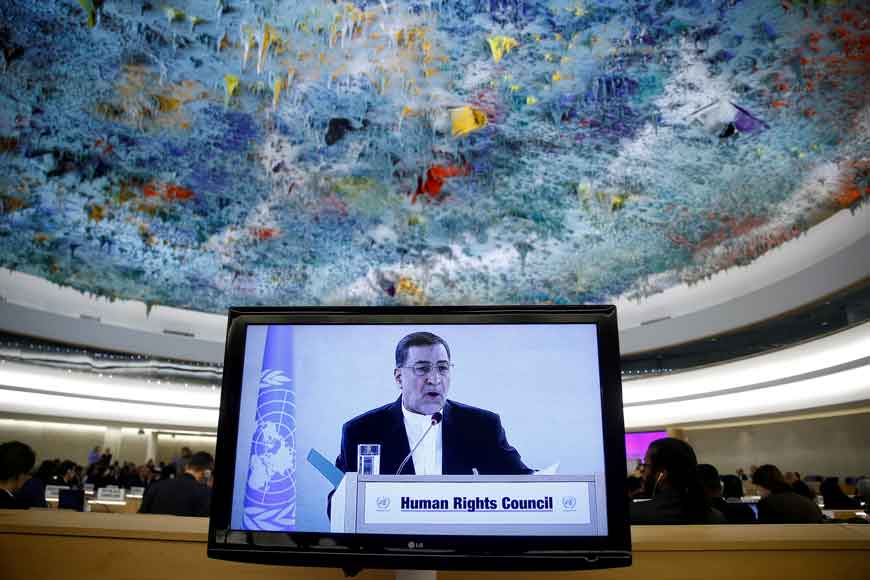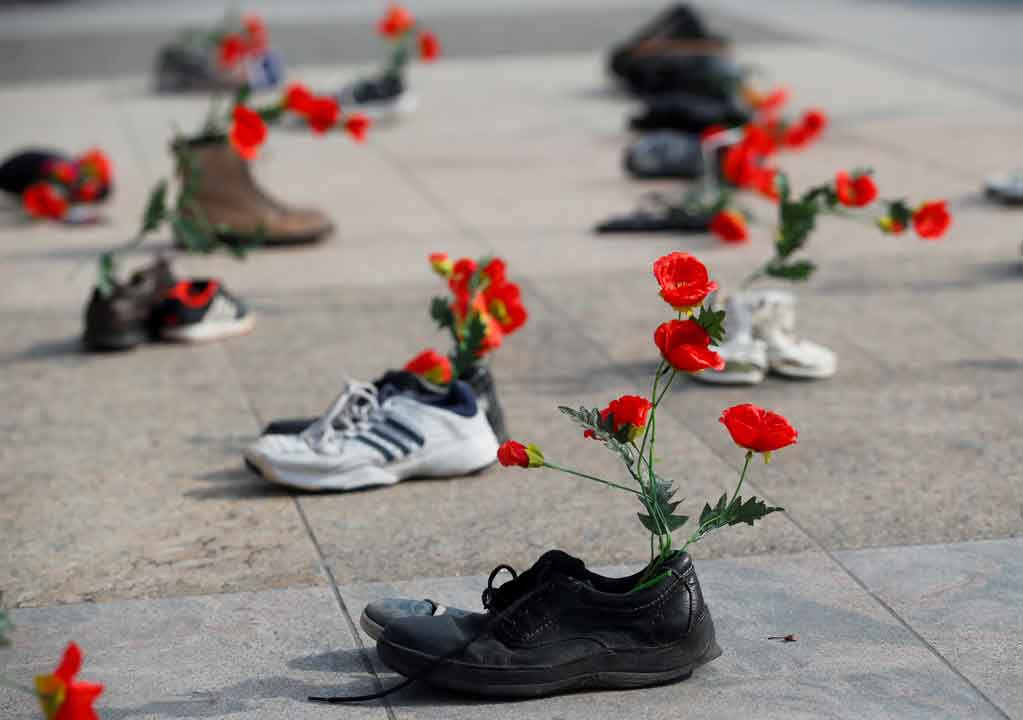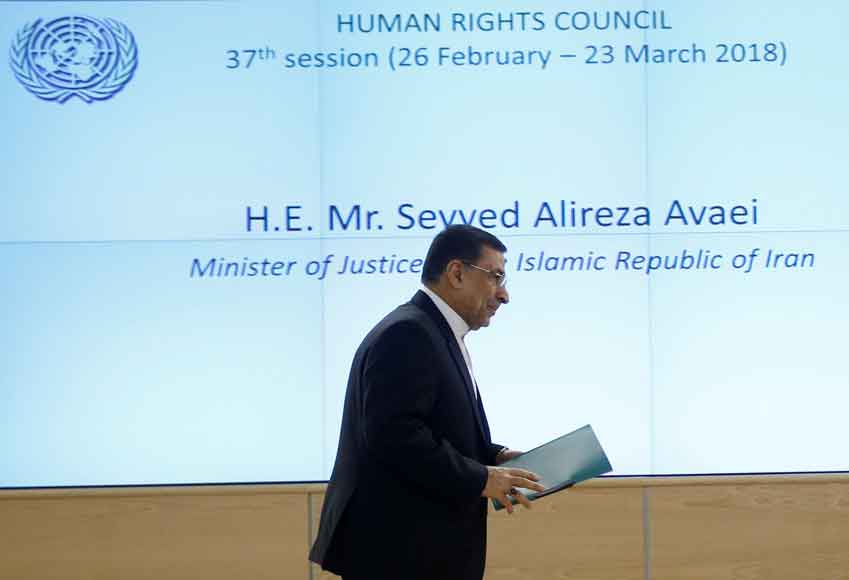March 11, 2018
By Majid Mohammadi
The presence of Seyyed Alireza Avaei, Iran’s Minister of Justice, at the 37th session of the United Nations Human Rights Council (UNHRC) in Geneva has posed a severe challenge to European countries. The European Union penalized Mr. Avaei with a travel ban and assets freeze in October 2011 for “human rights violations, arbitrary arrests, denials of prisoners’ rights and the increase of executions.”
Should we view the EU’s policy of appeasing President Hassan Rouhani’s government as part of a broader attempt by the West to keep the Iranian regime happy?

Have Western countries tried in the past four decades to accommodate the Islamic Republic? Some people think exactly the opposite. They believe that the West has consistently supported regime change in Iran, although there is no substantial evidence to that effect.
In 2002, the former U.S. President George W. Bush listed Iran as one of the three countries comprising the “axis of evil.” But his administration didn’t take any active measures against Iran. President Jimmy Carter [1977-81] avoided any conflict with the regime before and after the hostage crisis [the takeover of the U.S. Embassy in Tehran from November 4, 1979 to January 20, 1981.]
How can we explain the policy of appeasing the Iranian regime? There is no evidence suggesting that the Western powers either engineered the Islamic Revolution or supported the Islamic Republic. Quite the contrary: Iran has always looked to the East for support, particularly to the authoritarian governments of Russia and China. It follows their examples in its dealing with the international community.

There is also no evidence that Western powers have tried to topple the Islamic Republic. Some governments including President Donald Trump’s administration are waiting for the Iranian people to change the regime. Meanwhile, European countries have accepted the current governing system in Iran. During the 2016 election campaign, the then-candidate Trump said that he preferred to sit on a beach and leave the Middle East alone.
To keep Tehran happy, the West (EU, Canada, Australia, U.S.) has had to turn a blind eye to the regime’s human rights abuses, hostile foreign policies, and aggressive behavior. It has also tolerated the regime’s violations of international norms. President Barack Obama’s administration and the EU abandoned Western moral principals in their haste to sign the 2015 JCPOA agreement [the Joint Comprehensive Plan of Action, better known as the Iran nuclear deal] with Iran.
In this article, I’ll attempt to highlight the contradictions and consequences of the policy of appeasement which the West has pursued in its dealing with Iran in the past four decades.
There are three reasons behind efforts to appease the regime in Iran:
۱- A moderate government cannot exist within a theocracy. The West erroneously believes that [reformist] presidents including Rouhani and Mohammad Khatami [1997-2005] can fundamentally change the hardline views and despotic nature of the regime. Justice ministers in Mr. Rouhani’s first and second cabinets have committed gross human rights violations.
Meanwhile, the German government provides financial aid to Islamic centers with strong links to the regime, enabling them to organize anti-Israel and anti-U.S. marches on Quds Day every year. It is outrageous to argue that confronting the establishment in Iran would only strengthen the extremist elements within the ruling elite. The regime has consistently supported international terrorism, extended its military interventions, pursued its nuclear ambitions and brutalized its people. The Islamic Republic is as moderate as the Taliban [Islamic Emirates of Afghanistan] and ISIS [the Islamic State of Iraq and the Levant.]
۲- Making peace with a regime that dreams of dominating the world. It would be a mistake for European countries to think that they can make peace with Iran. Female European politicians who wear headscarves during their official visits to the country are most likely aware that the majority of Iranians oppose the compulsory hijab.
Contrary to some views, the JCPOA has increased the prospects of war. The regime has squandered the windfalls of the nuclear agreement on its regional ambitions instead of investing it in its people. Recent nationwide protests were the testament to people’s anger at the regime’s inability to tackle domestic economic problems.
The Obama administration cut funding for many human rights groups inside Iran. It exchanged many convicted criminals with four Iranian-American hostages in Iran. Former U.S. Secretary of State [Jim Kerry] praised [Qasem Soleimani] the head of the Islamic Revolutionary Guards Corps’ Qods Force (IRGC-QF). The result was the signing of the JCPOA. And that’s Obama’s legacy.
۳- Reforming the Islamists. The West deludes itself that it can transform the Islamic Republic through appeasement, engagement, and cooperation. Foreign investment will not help the regime to evolve. It will only feed Iran’s ambitions for regional hegemony.
There are also three inherent contradictions within the policy of appeasement:
۱- Western countries and other religions are not permitted to be active in Iran. By contrast, Iran has been able to promote Islam and its revolutionary ideology all around the world. The regime frequently detains, prosecutes and convicts Iranian citizens on espionage charges. Western countries have tied their own hands in their dealings with Iran. They will never win the propaganda war against the regime.
۲- The Iranian people have not benefited from international trade. Instead, revenue has been used to strengthen the Islamic Republic and its foreign allies. Lebanon’s Hezbollah was apparently the beneficiary of the cash that the regime received from the Obama administration. The government has not invested the oil revenue in developing the country’s infrastructure, education, health and welfare systems.
۳- The U.S. government has included the IRGC-QF on its list of terrorist organizations. According to Israeli intelligence, Obama opposed a plan to assassinate Qasem Soleimani, the head of the IRGC-QF.
What have been the consequences of the policy of appeasement?
۱- The Islamic Republic has remained the most significant threat to the world. It has a military presence in all of the trouble spots in the region. It brutalizes its people. The reformists, however, don’t distinguish between the regime and the country. They equate the overthrow of the Islamic Republic with the destruction of Iran.
۲- Despite Obama’s predictions, Iran didn’t join the international community after the signing of the JCPOA. The appeasement policy has not reduced tensions and animosity between Iran and many countries. All the conciliatory gestures towards the regime have failed to transform its ideological nature.
۳- Since its inception, the Islamic Republic has been at war with the U.S. and the West. The West has sometimes fought back, and at other times, has chosen to walk away.









